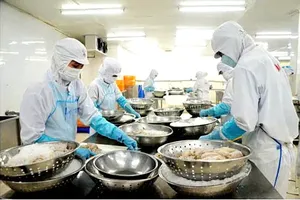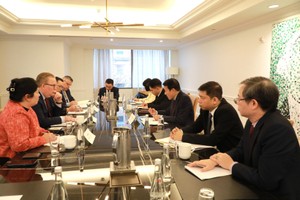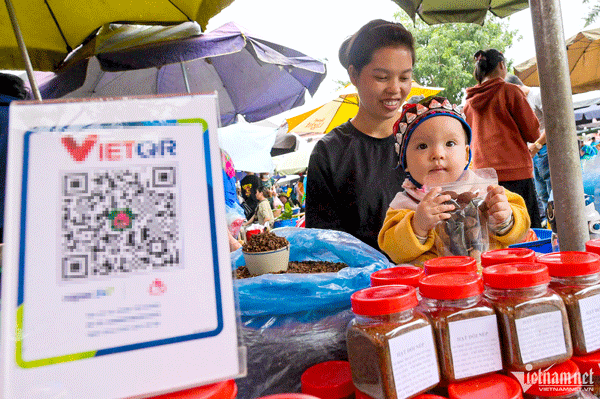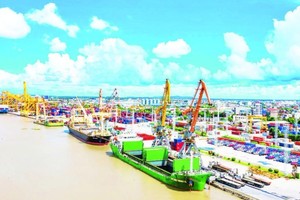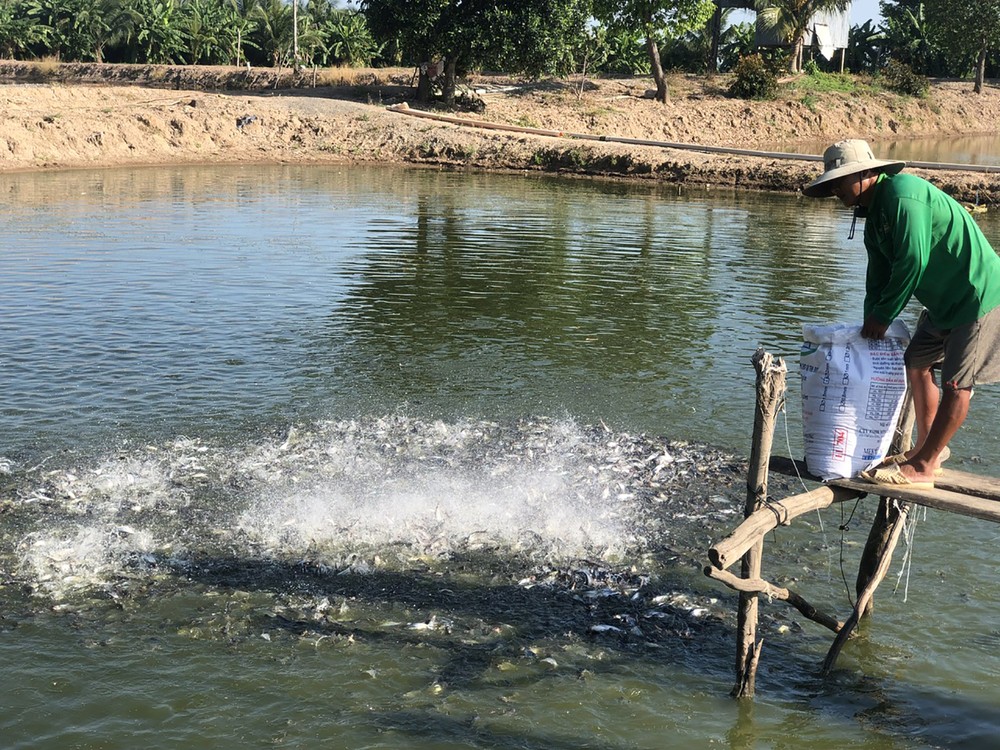
This is primarily attributed to the significant surge in feed prices since the start of 2023, which persistently remain high towards the year-end. Furthermore, the export market is displaying notable indications of contraction, compounded by unusual weather patterns and the onset of diseases.
Pangasius prices take a dive, exports on decline
The initial enthusiasm and anticipation felt by farmers in Hong Ngu City, Dong Thap Province, at the start of 2023, when profits from pangasius reached an impressive VND1,000 per kilogram, have now given way to anxiety and uncertainty. The usual trend leading up to the Lunar New Year sees pangasius prices fluctuating between VND28,000 and VND28,500 per kg, occasionally peaking at VND29,000 per kg. However, this year has seen a decline to VND26,500 per kg. Dang Van Mung, a pangasius farmer in Hong Ngu City, voiced his concerns, stating that at this price point, farmers are experiencing losses as the production cost for each kilogram of pangasius exceeds VND27,000.
Ms. Vo Phuong Thuy, Deputy Director of the Department of Industry and Trade of Dong Thap Province, revealed that Dong Thap contributes to over 40 percent of the pangasius farming area in the entire Mekong Delta region. Farmers are facing numerous challenges due to a decline in selling prices, coupled with rising production costs and input material expenses. According to Thuy, in the first half of 2023, the pangasius export market of 27 enterprises in the province witnessed a 20 percent slump compared to the same period last year, with only approximately 80 countries and territories remaining as trading partners. The average export price in the first six months of 2023 was a mere US$2.65 per kg, in contrast to the nearly $3.2 per kg recorded in the same period in 2022.
Acknowledging the current downturn in the pangasius industry, Mr. Vo Hung Dung, Secretary-General of the Vietnam Pangasius Association (VINAPA), anticipates a lengthy recovery period. The newly cultivated area for pangasius has surpassed 5,300 hectares by the end of October 2023, marking an impressive 85 percent increase compared to the same period. The harvesting area has also seen growth, exceeding 3,660 hectares, a 34 percent surge, with a production volume of over 1.33 million tons, a significant 61 percent increase from last year. However, despite these expansions, the export turnover has declined by 28 percent (totaling over $1.5 billion) compared to the same period, posing considerable challenges to this key industry in the Mekong Delta.
During the recent conference on "Evaluating the State of the Pangasius Industry in 2023 and Outlining Plans for 2024" in Dong Thap, the representative of Vinh Hoan Corporation (Dong Thap) disclosed that the company is encountering various challenges in consumer markets such as the US, the EU, and China. They reported a roughly 30 percent decline in the average volume of export orders for all markets, coupled with a drastic drop in selling prices. At present, escalating costs across farming, processing, exporting, quality control, logistics, and warehouse storage are exerting great pressure on seafood processing and export entities.
Heavy losses prompt shrimp farmers' reluctance to replenish stocks
According to Mr. Vo Quan Huy, Chairman of the My Thanh Shrimp Association in Soc Trang Province, most shrimp farmers in the region are exercising great caution when it comes to deciding whether to replenish stocks for the new crop. The global economic downturn has caused numerous challenges in the export market, preventing the price of raw shrimp from rising. At the same time, the cost of essential materials like shrimp seeds, feed, biological products, and medicine shows no signs of decreasing. Additionally, the success rate of shrimp farming is currently at an all-time low due to intricate weather patterns, environmental factors, and the prevalence of epidemics.
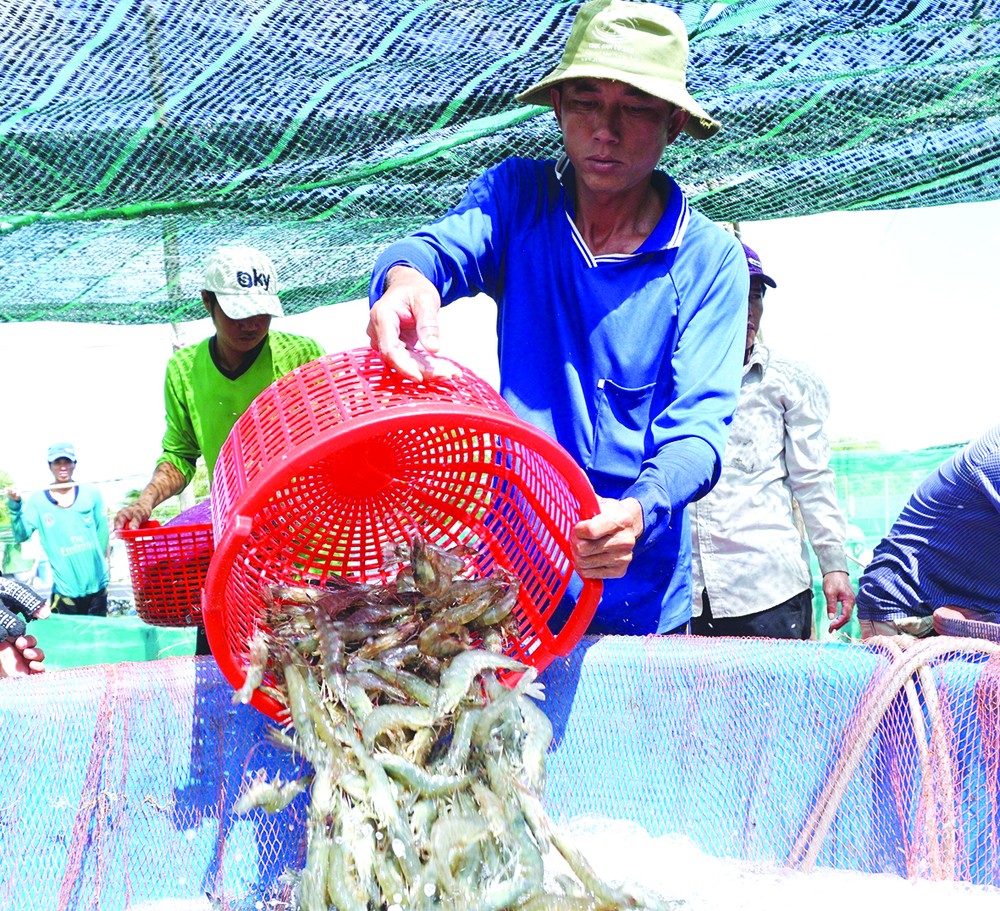
According to Ho Van Thanh, a shrimp farmer from Soc Trang, the prices of raw shrimp in 2023 have turned out to be much lower than what farmers had expected. This presents a paradoxical situation where shrimp prices are low, but the cost of feed has not decreased. In fact, it has increased with each farming cycle, leading to higher production costs. Thanh emphasized that the cost of feed alone (excluding medicine and biological products) already makes up more than 60 percent of the production cost per kilogram of shrimp. This investment cost has resulted in shrimp farmers operating without any profit, and there is a significant risk of incurring substantial losses if there are any delays in output.
Nguyen Van Lap, a shrimp farmer in Vinh Hau Commune, Hoa Binh District (Bac Lieu Province), shared that shrimp prices have been consistently dropping since the beginning of 2023. Currently, traders are purchasing 30-head-per-kilogram tiger shrimp for only VND110,000, while the 20-head-per-kilogram type is priced at around VND160,000—marking a decrease of VND80,000-VND100,000 compared to 2022. Lap calculated that three years ago, the investment cost for a shrimp pond with an area of 2,500 square meters was nearly VND100 million. After deducting post-harvest expenses, he made a profit of VND50 million. However, the current investment cost for a similar shrimp pond has more than doubled (around VND230 million). With the current shrimp prices, his family is only expected to earn about VND110 million at the end of the season, resulting in a loss of over VND100 million.
Mr. Ong Hang Van, Deputy General Director of Truong Giang Seafood Joint Stock Company: Export challenges and high storage costs
For the past decade, his business has never faced a cash shortage like this. The inability to export goods has prevented banks from disbursing loans despite having collateral. The challenges in exporting have caused a rise in inventory, resulting in a significant increase in the monthly cost of preserving goods for his company, amounting to approximately VND4 billion.
Mr. Tran Van Hung, CEO of Hung Ca Limited Liability Company: Safeguarding product quality and the industry's reputation
"The elevated cost of raw materials has resulted in higher pangasius prices. To secure market presence, some pangasius export enterprises have resorted to lower their selling prices but have compromised product quality by incorporating additives. This practice has not only narrowed the Vietnamese pangasius export market but has also posed additional challenges. Given this situation, I suggest that VINAPA coordinates with relevant entities to conduct inspections, ensuring the quality and reputation of the Vietnamese pangasius industry remain intact".
Mr. Duong Nghia Quoc, Chairman of VINAPA: Proposing a reduction in import taxes on raw materials for animal feed
VINAPA will make recommendations to the Ministry of Agriculture and Rural Development, seeking the support of the Ministry of Finance to lower import taxes on materials used in animal feed production to reduce the production costs of pangasius, help farmers reduce input expenses, and improve the value chain for the sustainable development of the pangasius industry, particularly amid the current challenging circumstances.

